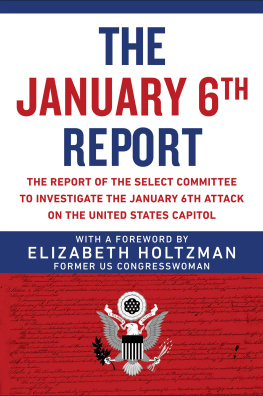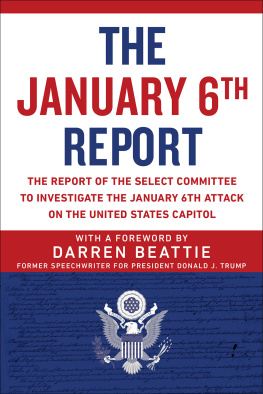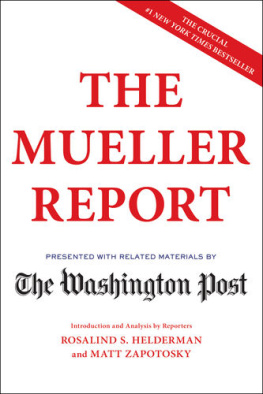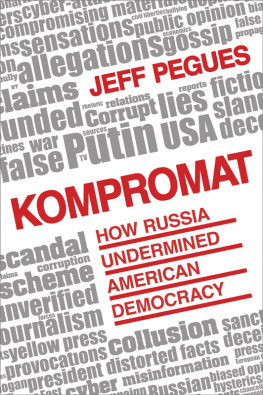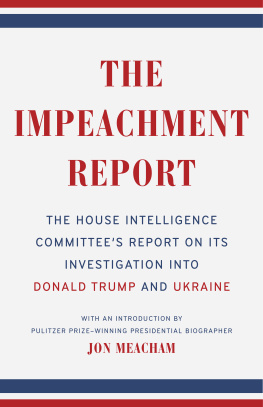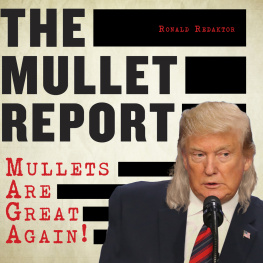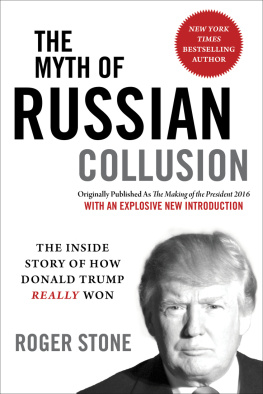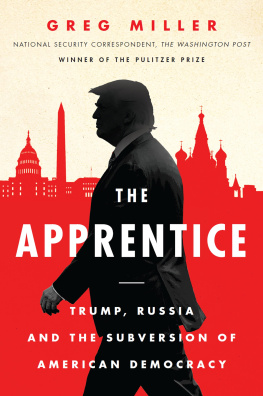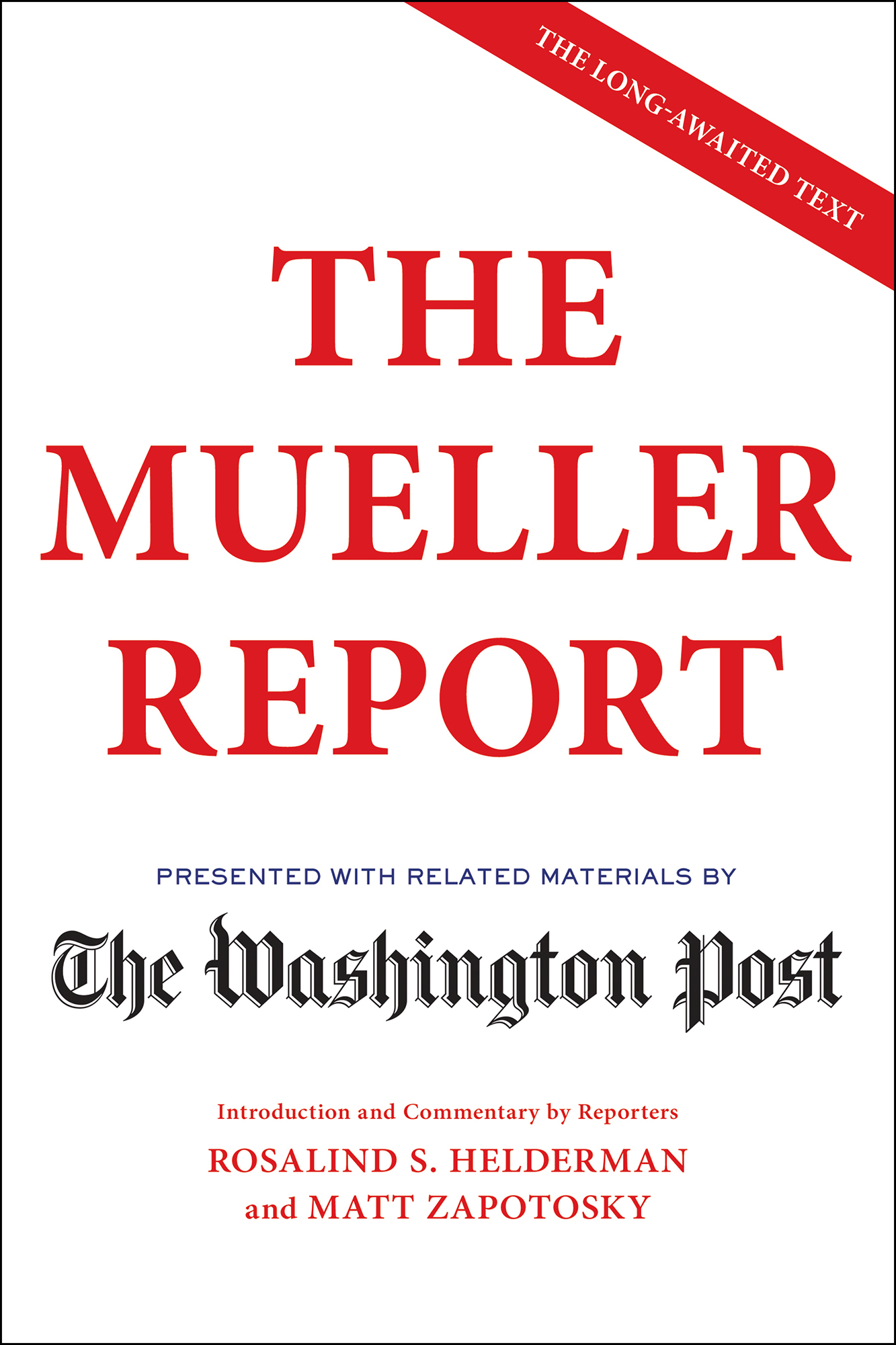Introduction: A President, a Prosecutor, and the Protection of American Democracy
by Rosalind S. Helderman and Matt Zapotosky of The Washington Post
The special counsel investigation that threatened Donald Trumps presidency was born of the commander-in-chiefs rage.
In his first months in office, Trump had seethed over FBI director James B. Comeys refusal to tell the world that the president was not being scrutinized personally as part of the bureaus investigation of whether the Trump campaign had coordinated with Russia to interfere with the 2016 presidential race.
On May 9, 2017, Trump snapped. In a sharp break from Washington norms that afford FBI directors ten-year terms to give the bureau independence from politics, the president unceremoniously fired Comey. He conveyed the news in a terse letter, hand-delivered to FBI headquarters by his former personal bodyguard.
Trumps closest aides had warned him that the move could trigger a political uproar and lead to an expansion of the Russia inquiryand it did.
Lawmakers on Capitol Hill cried foul. The FBI, already deep into its investigation of election interference, now feared that the most powerful man in the country was trying to obstruct its work. And Rod J. Rosenstein, the No. 2 official at the Justice Department, who had written a memo supporting Comeys dismissal, was incensed about the way the White House was pinning nearly all responsibility for the firing on him. He briefly considered resigning. Instead, Rosenstein turned to Robert S. Mueller III.
The deputy attorney general announced on May 17, 2017, that he had appointed the then-seventy-two-year-old Vietnam veteran and former FBI director to lead an independent investigation of interference in the 2016 election and other matters that might stem from the inquiry.
It was a broad mandate.
Over the next twenty-two months, Mueller, who had led the FBI through the attacks of September 11, 2001, and embodied the bureaus straight-arrow traditions, quietly and methodically investigated Trump and nearly everyone in his orbit, trying to determine whether any had conspired with the Kremlin to tilt the election, and whether the president himself had tried to obstruct justice.
That investigation culminated on March 22, 2019, when Mueller formally concluded his work and submitted a final report to Attorney General William P. Barr.
Barr held a press conference the next month less than two hours before the two-volume Mueller findings Report on the Investigation Into Russian Interference in the 2016 Presidential Election would be turned over to Congress. The attorney general noted repeatedly there was no collusiona word Trump had popularized as he attacked the investigationand Barr revealed how the White House and Trumps personal lawyers had been given an advance look at the redacted document.
Barrs description of Muellers report was favorable to Trump. In addition to finding no coordination between the Trump campaign and Russia, the attorney general said, Mueller had declined to reach a conclusion on whether the president had obstructed justice.
But the anodyne description belied what would soon be released. Muellers report, despite redactions, offered a stunning account of how Russia worked to help the Trump campaign and how Trumps associates were willing to accept Russian assistance, and it presented an explosive and detailed narrative of how Trump sought to shut down the investigation as he worried about its impact.
This is the end of my presidency, Trump said, by Muellers account, when he learned of the special counsels appointment. Im fucked.
Somethough not allof what Mueller revealed had already been publicly known, though the report added layers of both facts and legal analysis. It told readers what the special counsel believed really happened at some shadowy, meetings. Muellers team, for example, described how in early August 2016, Trumps then-campaign chairman, Paul Manafort, met with a man whom the FBI had assessed as having ties to Russian intelligence and that that individual wanted to deliver in person a peace plan for Ukraine that Manafort acknowledged to the Special Counsel's Office was a 'backdoor' way for Russia to control part of eastern Ukraine.
Both men believed the plan would require candidate Trump's assent to succeed (were he elected President), the special counsel wrote. They also discussed the status of the Trump Campaign and Manaforts strategy for winning Democratic votes in Midwestern states.
Mueller over and over again detailed moments when Russian government officials and others tried to make contacts with Trump's campaign, including a number of episodes not previously revealed in press coverage: A New York banker told the campaign about an outreach he'd received from "senior Kremlin officials" and tried to invite Trump to Russia; Russian Deputy Prime Minister Sergei Prikhodko emailed Trump's assistant to ask the then-candidate to attend a Russian economic forum.
But the report confirmed, as Barr had suggested, that Mueller did not find a conspiracy between the Trump campaign and the Russiansthough it suggested they had a shared motive.
Although the investigation established that the Russian government perceived it would benefit from a Trump presidency and worked to secure that outcome, and that the Campaign expected it would benefit electorally from information stolen and released through Russian efforts, the investigation did not establish that members of the Trump Campaign conspired or coordinated with the Russian government in its election interference activities, Muellers team wrote.
Mueller made clear that prosecutors did not consider "collusion" a legal term and never performed an analysis of that issue. They instead looked to see whether campaign aides made any agreements with Russians to assist in their effort to interfere in the election. Using that standard, they found no signs of coordination between the campaign and Russia.
The report also confirmed Mueller had declined to reach a conclusion on obstruction, though it suggested that decision was heavily influenced by Justice Department legal guidance that says a sitting president cant be indicted. Muellers team wrote that, based on that and other Justice Department policies, they decided not to apply an approach that could potentially result in a judgment that the President committed crimes.
Barr said he and Rosenstein reviewed the evidence themselves and determined it was not sufficient to make a case.
Muellers report offered a less charitable version for Trump: describing how, more often than not, Trumps aides essentially saved their boss from his worst impulses by ignoring his directives to interfere with the Mueller investigation. In perhaps the most stark example, the report alleged that Trump called White House Lawyer Don McGahn in June 2017 and told him to tell the acting attorney general that Mueller had to be removed.
McGahn did not carry out the direction, however, deciding that he would resign rather than trigger what he regarded as a potential Saturday Night Massacre, Muellers team wrote, referring to the night when President Nixon ordered his attorney general to fire a special prosecutor, triggering a cascade of resignations.
The evidence we obtained about the Presidents actions and intent presents difficult issues that prevent us from conclusively determining that no criminal conduct occurred, Muellers team wrote. Accordingly, while this report does not conclude the President committed a crime, it also does not exonerate him.


